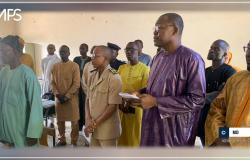During a council of ministers, the new authorities launched the plan to combat the high cost of living. The President of the Republic had asked Prime Minister Ousmane Sonko to the ministers in charge of Trade and Industry, Finance and Budget, and Agriculture, to propose to him, before May 15, 2024, a plan for operational emergency to combat the high cost of living, including bold measures to reduce the prices of everyday consumer goods, as well as certain essential services. An ambition which created hope among the Senegalese who needed to make ends meet.
But Bassirou Diomaye Faye wants to tackle this question head on. It was necessary to think about setting up an early warning and monitoring system for the country’s prices and supplies of essential products and commodities. Also, the Prime Minister and his government were instructed to play on the deregulation of the markets for consumer products and services in terms of supply, stocks and prices. »
“The approved wholesale and especially retail prices of rice, sugar, oil, flour, milk and bread in particular, must be subject to special and permanent surveillance by the government and competent state services” had even indicated the Head of State in the Council of Ministers.
Strengthening the private sector
On April 24, the President of the Republic Bassirou Diomaye Faye received the private sector made up of several actors. The objective was to discuss the mechanisms of working in symbiosis to reduce the cost of living. The private sector is an important link in the Senegalese economy. Moreover, without being pretentious, “it is up to the private sector to create jobs and wealth… with, of course, support from the State”. It is an attempt that former President Macky Sall also attempted several times with the same actors to reflect on the question of the cost of living.
Macky Sall’s last attempt was with the “combat government” led by former Prime Minister Amadou Bâ who during his declaration of assets had argued: “To deal with our priorities and emergencies, the President of the Republic set up a Government of action, a government of combat: fight against the high cost of living, floods; fight for employment, food sovereignty, growth, in a word, for the satisfaction of the needs of the populations to transform the hopes of the populations into victories”, but have they succeeded in their mission? Apparently not because President Bassirou Diomaye Faye and his Prime Minister seem to be looking for the right formula. But has Prime Minister Ousmane Sonko “already resigned”? Very early to answer in the affirmative. The head of government had stated his position: “if there is an increase in prices we must see who is the author? We found prices that we bitterly noted. Also, we must base ourselves on the fluctuations of the international market…”
This intervention by Ousmane Sonko even aroused indignation among some who noted a discrepancy between the words of a PM and an opponent who aspired to come to power.
So, what is Minister Serigne Guèye Diop based on to suggest that the reduction will take place in the coming days? Ousmane Sonko, however, conducts his consultations at the national level with all stakeholders, notably importers, exporters, employers, bakers, etc.
The primary sector, the guarantee of food security
Indeed, the primary sector occupies an important place in the Senegalese economy, but its contribution to GDP estimated at 16% in 2021 remains low in view of Senegal’s agricultural, pastoral and fishing potential. This primary sector is driven by agriculture which represents 9% of GDP. For Diomaye Faye’s regime, it is important to develop the primary sector to guarantee food security and the consequent generation of foreign currency for the national economy. It will therefore be necessary for the minister in charge of agriculture to create favorable conditions for agricultural development with the aim of ensuring food security and improving the standard of living of rural populations.
For Diomaye and his team, “a model of agricultural landscape structured around small and medium-sized modernized family farms, with diversification through sectors such as beekeeping, market gardening or poultry farming, capable of improving and stabilizing sources of producers’ income” is a necessity to overcome this problem linked to the high cost of living because, making us sovereign.
The issues of sovereignty and food security in the territories constitute major strategic issues for global players, from all sides, whatever the level of development of the country, rich, aspiring or poor, today more than yesterday, for future generations.
Senegal, under Macky Sall, through its National Food Sovereignty Strategy (SNSA), has embarked on an ambitious effort to achieve food sovereignty by 2028, while stimulating economic and social development until 2035 This strategy aimed to strengthen production and productivity in the primary sector, while emphasizing self-sufficiency in priority sectors, notably cereals, horticulture, livestock products, and livestock products. fishing and aquaculture.
However, the current president also focuses the imperative of food security on agriculture, livestock and fishing. Will Bassirou Diomaye Faye succeed where Macky Sall was unable to achieve this objective which can be one of the solutions to the high cost of living? The next steps of the current regime will edify us…






